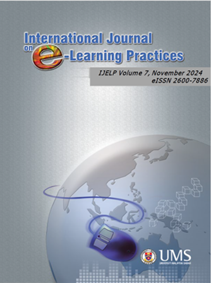INVESTIGATING THE IMPACT OF WEB-BASED LANGUAGE LEARNING (WBLL) THROUGH WRITE & IMPROVE ON WRITING SKILLS IN SECONDARY SCHOOL
DOI:
https://doi.org/10.51200/ijelp.v7i1.5452Keywords:
Web-Based Language Learning, Writing Skills, Write & Improve, Secondary SchoolAbstract
This study examines the impact of Web-Based Language Learning (WBLL) using the program Write & Improve on secondary school students' writing skills at SM St. Michael, Penampang, using the Social Cognitive Theory (SCT). The study sought to investigate students' perspectives and impact in writing through guided practice and feedback. The technique used a two-cycle action research design that included both writing activities and open-ended surveys to collect information about students' writing performance and perceptions. Initial studies revealed that students struggled with the tool's UI and feedback mechanisms, restricting their development throughout the first cycle. However, significant increases were seen in the second cycle, with students obtaining higher CEFR bands and showing a greater grasp of feedback. Surveys revealed high satisfaction and perceived effectiveness of Write & Improve, despite some technical issues and occasional inaccuracies in feedback. The study emphasizes the significance of teacher participation, as SCT and Vygotsky's Zone of Proximal Development (ZPD) indicate that directed learning and feedback can improve student outcomes. Researchers should conduct longitudinal investigations and perform different demographic testing. For educators, the findings emphasize optimal practices for incorporating WBLL technologies into instruction. This study adds to the growing body of knowledge about digital learning aids as well as providing ideas for better writing teaching through technology.
References
Bandura, A. (1986). Social foundations of thought and action: A social cognitive theory. Englewood. Cliffs, NJ: Prentice-Hall
Huijser, Henk and Fatema Wali. (2018). Write to improve: exploring the impact of an automated feedback tool on Bahraini learners of English. Learning and Teaching in Higher Education: Gulf Perspectives, 15: 1, 1-21.
Karpova, Kateryna. (2020). Integration of Write and Improve AWE tool into EFL at higher educational establishment: case study. Celtic: A Journal of Culture, English Language Teaching, Literature and Linguistics, 7: 2, 137-150.
Lin, W., Shie, J., & Holmes, P. (2017). Enhancing intercultural communicative competence through online foreign language exchange: Taiwanese students’ experiences. The Asian journal of applied linguistics., 4(1), 73-88.
Ministry of Education Malaysia. (2017). Malaysia Education Blueprint 2013-2025 (Higher Education).
Muftah, M. (2023). The Effects of Web-Based Language Learning on University Students’ Translation Proficiency. Journal of Applied Research in Higher Education, 15(5), 1420–1439.
Oflaz, M., Yelkin, A., Coşkun, D., & Bolat, Ö. (2022). The effects of the technology-integrated writing lessons: CIPP model of evalution. The Turkish Online Journal of Educational Technology, 21(1).
Podburtnaja, E. (2021). Analyzing Cambridge English Write & Improve as a supplementary resource for practicing writing in an English classroom: a case study. Academia.edu.
Poe, M., & Elliot, N. (2019). Evidence of fairness: Twenty-five years of research in Assessing Writing. Assessing Writing, 42, 100418–100418. https://doi.org/10.1016/j.asw.2019.100418
Stufflebeam, Daniel L. (2003). The CIPP Model for Evaluation. (s. 1-68). Portland, Oregon: Annual Conference of the Oregon Program Evaluators.






